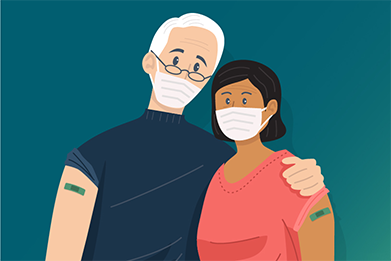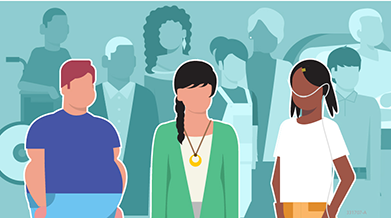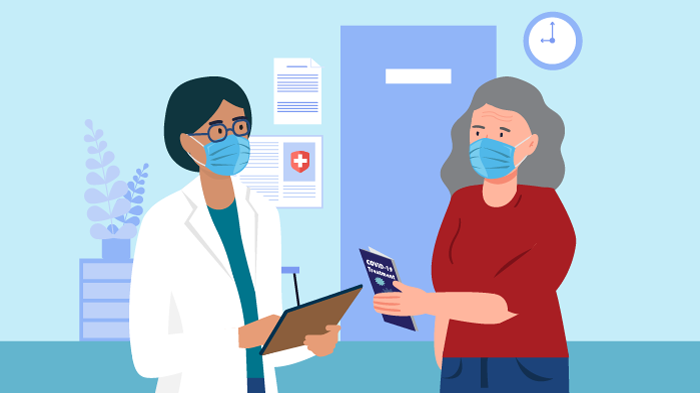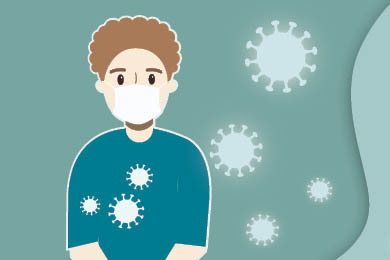Recommendations for Fully Vaccinated People
COVID-19 Homepage
Factors That Affect Your Risk of Getting Very Sick from COVID-19
Vaccination, past infection, or timely access to testing and treatment can help protect you from getting very sick if you get COVID-19. However, some people are more likely than others to get very sick if they get COVID-19. This includes people who are older, are immunocompromised, have certain disabilities, or have underlying health conditions. Understanding your COVID-19 risk and the risks that might affect others can help you make decisions to protect yourself and others.
Factors That Raise Your Risk of Getting Very Sick from COVID-19
Age

Older adults (especially those ages 50 years and older, with risk increasing with older age) are more likely than younger people to get very sick if they get COVID-19. This means they are more likely to need hospitalization, intensive care, or a ventilator to help them breathe, or they could die. Most COVID-19 deaths occur in people older than 65.
Immunocompromised or a Weakened Immune System
Having a weakened immune system, also known as being immunocompromised, can make you more likely to get very sick if you get COVID-19. People who are immunocompromised, or who are taking medicines that weaken their immune system, may not be protected as well as others, even if they are up to date on their vaccines. For this reason, it is important to have a COVID-19 plan to protect yourself from infection and prepare for what to do if you get sick.
Learn more about the importance of COVID-19 prevention, including developing a COVID-19 plan for people who are immunocompromised.
Underlying Health Conditions

Certain underlying health conditions you have (for example, obesity or chronic obstructive pulmonary disorder) may affect your risk of becoming very sick if you get COVID-19.
Often, the more health conditions you have, the higher your risk. Certain conditions increase your risk more than others. For example, severe heart disease increases your risk more than high blood pressure.
Learn more about how different underlying health conditions affect the chances of getting very sick or dying from COVID-19.
Factors That Can Help Protect You from Getting Very Sick from COVID-19
Vaccination

COVID-19 vaccines are safe and effective. Staying up to date with your COVID-19 vaccines is the best way to protect yourself and others around you from getting very sick, being hospitalized, or dying from COVID-19.
People who are up to date with their COVID-19 vaccines are far less likely to be hospitalized or die from COVID-19 than people the same age who have not been vaccinated or who are not up to date on their COVID-19 vaccines. However, even though vaccines reduce their risk, some people, particularly older adults with multiple underlying health conditions or people who are immunocompromised, can still get very sick from COVID-19.

If you are at increased risk for getting very sick from COVID-19, free medications are available that can reduce your chances of severe illness and death. Treatment needs to be started within a few days of infection to be effective. It can also help to have a plan for what to do if you feel sick or are diagnosed with COVID-19, especially if you have barriers to testing or treatment, such as transportation challenges or lack of insurance.
Find free at-home tests, a Test to Treat location, or a community-based testing site near you.
Previous Infection

Having a previous infection with the virus that causes COVID-19 offers some protection from future illness. However, people who have had previous infections can still be reinfected and get severe COVID-19, especially if their previous infection was months ago or with a different variant (e.g., Delta variant). There are also risks to being repeatedly infected, including the potential of longer term symptoms or development of post-COVID conditions.
Studies show that people with previous infections who are vaccinated are less likely to be hospitalized than those with previous infections who are not vaccinated. This means that people who have had previous infection should still get vaccinated to increase their protection against COVID-19. Getting a COVID-19 vaccination is a safer way to build protection than getting sick with COVID-19.
Learn how getting vaccinated after recovering from a previous COVID-19 infection can help protect you from getting very sick in the future.
Equity Considerations
People with disabilities and those from certain racial and ethnic minority groups might be more likely to get very sick and have adverse health outcomes from COVID-19 because of factors stemming from societal inequities [86KB, 5 pages]. CDC established the COVID-19 Response Health Equity Strategy: Accelerating Progress Towards Reducing COVID-19 Disparities and Achieving Health Equity [86KB, 5 pages] and provides additional resources to advance the vision of all people having the opportunity to attain the highest level of health possible.